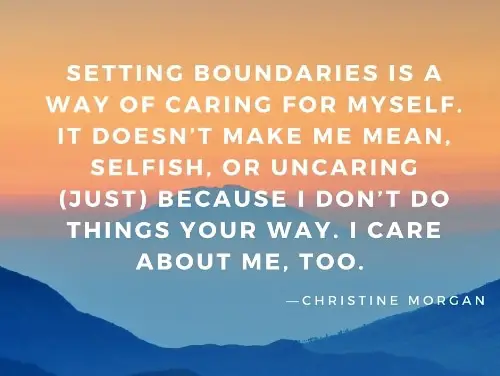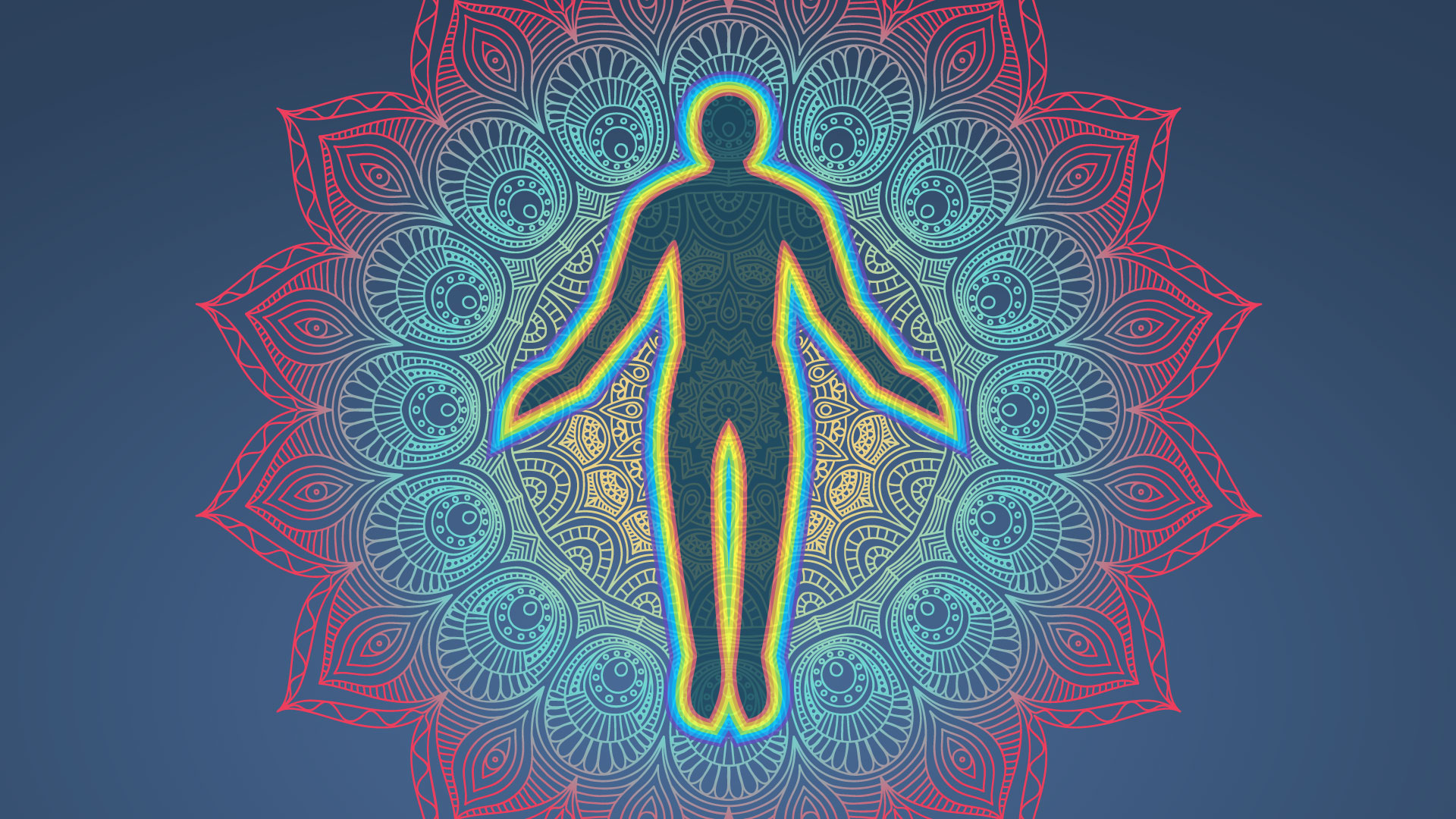Defining where someone else begins and you end seems like an odd thing to do, but if you are an empath, separation of the “Self” from others, even with all the talk of accepting our connectedness as part of the One, is crucial. Here’s a little insight into why setting personal boundaries is so critical, and why empaths may have an especially difficult time doing it.

As an empath, even more so than in “regular” folks, taking on other people’s emotions can be exhausting. Just walking down a hallway of a well-populated building, you may take on anger, fear, jealousy, fear, and any number of emotions which stick to you like glue, and even feel like your own. You may absorb these emotional states subconsciously, but feel them viscerally.
In extreme cases, these absorbed emotions can make an empath physically sick. Oddly, an empath does this automatically. Others among us, learned to simply ignore their own needs as a coping method in families that demanded they be “grown-up” or responsible for themselves prematurely.
If you are care-taking for someone who is sick or addicted, or it is your job to be a compass for a big group of people as part of your career, you may feel even more emotionally depleted, even though deep down you want to care for others.

A lack of healthy boundaries can cause us to say yes to every “opportunity” which arises, whether it’s social, personal, or business-related, and then either exhaust ourselves by trying to do too much while carrying a great amount of resentment, or simply “check out” and leave everyone hanging after we’ve over-committed.
Empaths are Connectors and Conduits
As an empath, you are a conduit and a connector. Much of this happens below your conscious awareness, but many empaths or sensitives are acutely aware that they feel others feelings as if they were theirs. This differs from sympathy where we may be familiar with what someone may be going through.
As an empath, we are wired to experience grief, pain, joy, hurt, and love at the extreme ends of the spectrum. It is more than an intellectual experience of another’s feelings, thoughts or attitudes. It is not simply a vicarious experience of these things. The empath experiences another’s pain, literally as their own.

This “skill,” though some may not yet see it as a strength, and rather a weakness, is what allows us to have an impeccable ability to transcend the “other” syndrome which plagues the modern world. We are the opposite of the psychotic or psychopath, who feels nothing, and has no capacity for empathy, and therefore can inflict devastating pain – as he feels no sense of moral grief, or personal responsibility.
A psychotic is detached from reality, and an empath experiences it in high-definition. In the same way that a psychotic is more likely to be a danger to society, due to their inability to relate to others’ feelings, an empath is in danger of losing themselves because they relate so completely.

Because empaths experience emotions so powerfully, they are more likely to have little tolerance for greed, usury, negativity, meanness, and other shadow qualities of the human psyche. They are simply more sensitive to them, and so, boundary making becomes an act of life-saving. If they don’t establish clear boundaries, then then lose themselves, quite literally, in another’s emotional battles and wars.
Five Ways to Tell If You Have Healthy Boundaries in Place
For everyone, including empaths, we can usually tell if we lack healthy boundaries, a signifier of healthy self-esteem, by our actions:
- Do people expect you to drop everything you are doing at a moment’s notice to give them your full attention?
- Do you answer your phone or email no matter what is going on in your life?
- Do you receive praise and acceptance for the things you do for others, or are they largely ignored, perhaps even ridiculed?
- How do you usually feel after spending time with friends and family in your life? Are you passionate and empowered, or do you feel emotionally drained?
- Do you always say yes, even when you aren’t sure you want to do something?
Empowerment Through Boundary Making
The first thing you can do to start setting healthy boundaries is listen to your inner yes and no. If you aren’t sure if something is a “yes,” or “no” because you have become clouded by ignoring your own desires, and are constantly absorbing other people’s emotional baggage, take some time to be alone and ask yourself, “is this my stuff?” Am I doing what I want to be doing, or am I doing someone’s heavy lifting, feeling their emotions for them, instead of allowing them to sift through them, and learn from the lessons those emotions bring?
If you’re inner compass isn’t sure if you should spend time with someone or create a little space, make sure you don’t decide what to do when you are stressed, but notice over time how they make you feel. This is an indicator if you are absorbing their emotions, and that you may need to create a buffer zone between yourself and the other person. If you are feeling exhausted, depressed, or chaotic consistently around another person, this is a big alarm going off that they may not need to be in your life.
Cut Energetic Cords Without Cutting Out the Relationship
You can also cut energetic chords with someone without cutting them out of your life. There are good attachments and attachments which don’t serve your continued growth. If you aren’t sure whether there is an energetic chord between you and someone else, sit and experience your emotions regarding them when they are not present. This will tell you what you need to know. Caroline Myss talks about how to cut chords extensively in her work.
Increase Your Self Care
Self-care is bigger than taking care of what you eat and how often you get to the gym. Self-care honors you just as much as others. You give your own well-being just as much importance as your care-taking of others. Self-care can include giving yourself the space and time to decide if something is right for you, and giving yourself permission to do what you want to do even if it upsets others – like not attending a party, or refusing to be the executor of someone’s will.
Tell Your Workaholic to Chill Out
As empaths, your work is never done. This also makes boundary setting absolutely vital to your own physical, energetic, emotional, and spiritual health. If you are constantly fixing other’s problems, or even your own due to neglect of boundaries, it’s time to teach yourself to slow down. Work less. Play more. On purpose.
Don’t Numb Out
An empath can’t really numb out, but they can temporarily check out, only to feel all the emotions they’ve absorbed from others come back in a tumultuous tidal wave later on. When you are feeling overwhelmed, it may mean that you need to temporarily reset your boundaries with someone, allowing them to get closer to you at a later date.
Stay Grounded
Literally. Walk on the earth. Let it absorb some of those heavier emotions you’ve sucked up like a Hoover vacuum. Grounding can help to reset the energy system and realign the chakras so that you can face another day of energetic super-sensitivity all over again.

Just Let Go
Let this mantra become your best-friend, “I choose to let go of what isn’t mine.” If you have been in the habit of taking everything on, letting go can feel scary or even unnatural. Once you’ve discovered you’ve been picking up other people’s emotions and have lacked healthy boundaries, forgive yourself, and them, and let it go. Focus on your own breath and your own body and start anew. You are a processor and amplifier of energy, but you need to consistently clear out and give up all the energy you’ve absorbed. Boundaries will help you when you need “me-time” to off-load.
Images: Source, Source, Source, Source, Source, Source
Featured image: Source


